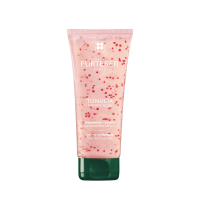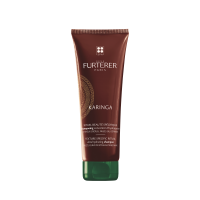
Search by problem, range or type of product
A scalp that itches, feels tight, and develops dry dandruff is a dry scalp. This is caused by a lack of sebum secreted by the sebaceous glands. It's a kind of alarm signal: the scalp is lacking hydration.
A poorly hydrated scalp also has an impact on the hair: it often becomes dry, dull, and coarse.
What can I do to hydrate a dry scalp? How do you compensate for the lack of sebum at the hair root? Numerous products allow you to deeply hydrate your scalp. René Furterer lifts the lid on the different remedies and the hair routine that you should adopt.
The scalp is considered dry when the skin is tight and itchy. These symptoms are often accompanied by dry dandruff. These small white flakes tend to fall on the shoulders when styling or brushing the hair. A dry scalp can be caused by many factors:
● skin conditions,
● emotional or physical stress,
● genetic factors,
● hormonal changes,
● exposure to significant pollution,
● poor diet,
● smoking,
● taking certain medications,
● regular use of heated styling tools (straightening iron, curling iron, hairdryer),
● chemical straightening and perms.
Very often, the cause of a dry scalp is simply the use of hair products that are unsuitable for your hair type, or with a composition that is too aggressive.
Adopting a good hair routine is the first thing to do to care for a scalp that is too dry. The scalp is actually often prone to micro-inflammations. Even if minor, inflammation can cause tightness and pain that must be treated.
Massaging the scalp with nourishing oils is the first step in combating a dry scalp. However, this is not always enough: often, the only solution to regain supple, hydrated skin is to include gentle, nourishing products in your hair routine. These help to repair the skin and provide lasting protection against dryness on a daily basis.
The products you choose should have two objectives: to care for a dry scalp and to hydrate the hair, which is also dried out by the lack of sebum at its roots.
You should turn to solutions rich in natural active ingredients, which will allow the scalp to benefit from all the benefits of plants and essential oils.
Silicone and aggressive substances should be avoided. These ingredients do not provide any benefits for the scalp, or for the hair.
The scalp scrub is also an important product to incorporate into the hair care routine of people with dry scalps. The scrub removes loose dry dandruff, hair product residue and impurities from the scalp, which can be beneficial for people suffering from dandruff and a dry scalp.
Concentrates are soothing treatments for the scalp. Applied regularly, they help to hydrate the scalp and make it more comfortable. René Furterer concentrates contain cold essential oils, perfect for cleansing and refreshing the scalp without drying it out.
Serum treatments should be applied to dry hair or after washing, without rinsing. Frequent use of these products helps to bring hair back to life while hydrating the scalp.
Shampoos for dry hair also take into account the scalp’s need for hydration. Used several times a week, they deeply hydrate the skin and hair fiber. Some shampoos are suitable for dry hair, while others are specially designed for very dry hair and scalps. These are then much softer and more hydrating.
Alternating dry scalp shampoos and anti-dandruff shampoos can be an excellent beauty routine: these nourishing shampoos help to rid the scalp of dry dandruff and nourish it with water.
Nourishing oils and hair masks are perfect for combating dry scalps. To hydrate intensely, these treatments should be applied to the hair for several minutes. This gives them time to deeply nourish the hair and scalp.
Be careful not to overload these products at the roots: when applied in too large quantities, they tend to produce the opposite effect, i.e. make the hair greasy. Thorough rinsing is necessary.

